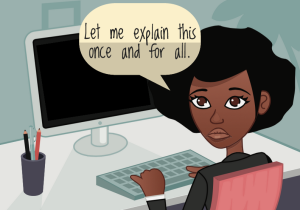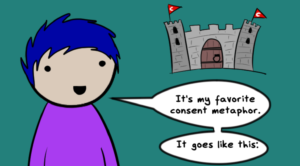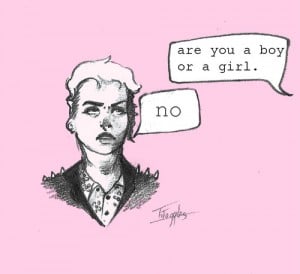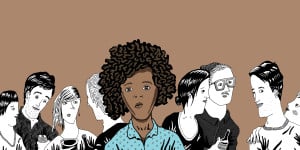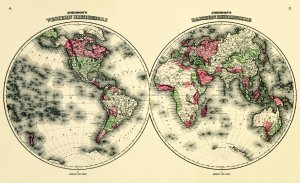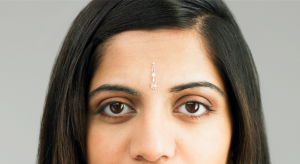I accepted the fact that I was not a man only recently, though I’ve felt unlike a man for a very long time. I’m not sure how to explain it, really, other than to say there is nothing specific to “manhood” that I want to keep and nothing about it I am unwilling to challenge.
If manhood were to disappear, I’d still be here. I am so much more than it and it so much more than me.
I am still learning my genderqueerness. Or maybe my agenderness, as I’m not even sure gender resonates with me. I recently discovered and felt a connection to the term demiboy based on the fact that I do sometimes feel a partial connection to boyhood (though having this connection is different from being a boy).
I’m discovering a lot of things, and to say I understand myself and my gender (or lack thereof) completely right now would be the most magnificent lie.
But the one thing I do understand is that when most people see me, they still interpret me as a “man.” And when I see myself, I see how they come to that conclusion. It’s the conclusion that I forced myself to come to for almost all of my life.
At the moment, I have no interest in presenting myself any more femme than I do. About half of my clothes are from the women’s section, and I have no problem rocking nail polish, makeup, and eyeliner. I loved my long hair (before my “male patterned baldness” kicked in), but I also feel natural with my facial hair, broad shoulders, and muscular build.
At most, in the eyes of a binary-attached society, I present as a man who is a bit feminine.
But what is a “man?” What is “feminine?” Are there no bald women? Women with facial hair, broad shoulders, and a muscular build? What about nail polish, makeup, eyeliner, and long hair are antithetical to manhood?
What Is Specific to Manhood That Allows One to Identify a Man?
Most of us seem to have a general understanding of what others mean when they use binary language, but even scientists cannot agree on whether sex is based on hormones, chromosomes, or genitalia (or at least cannot agree on the specific combinations of those).
Most perspectives that are inclusive of trans and gender non-conforming people seem to acknowledge the psychic element of gender and its inability to be defined by any singular biology or physical presentation. In short, gender is not a total reality, or at least not the same reality for everyone.
And in my reality, I am not a man.
Yet gender is a social reality that we all seem to be able to recognize on some level, even as we don’t understand completely how. And as someone who has been perceived as a man their entire life, I am afforded the benefits of that perception.
On a gendered level, our society was set up with certain advantages for being a cisgender man, and, as it sees me as such, I have access to many doors that would have been shut otherwise.
But many times I’ve been kicked, painfully, through those doors.
Certainly, there is a lot of pain in not being afforded the right to realize being a gender you weren’t prescribed or realize being ungendered.
Gender non-conforming, genderqueer, genderfluid, agender, and other non-binary folks are constantly forced into cages into which we do not quite fit (and, for some of us, into which we don’t even a little fit).
Perceived Maleness, Like Every Identity, Is Intersectional – Providing Both Benefits and Detriments
The violence inflicted by being inside those cages can’t be understated. My inability to properly connect with the gender I was told I was meant to be was an experience filled with anxiety, confusion, self-loathing, and other significant injury.
And yet, it was also an experience that allowed me to escape (and even enact) the same types of violence that my sisters and mothers experienced at the hands of men. My ability to easily put on male drag, which is not a privilege afforded to every other non-binary person (in fact, “male drag” can not only be damaging to force oneself into, for some it is practically an impossibility), allowed me many opportunities.
For example, I am able to comfortably enter places of employment in male drag, conduct conversations about salary in male drag, and walk down the street without too much fear of being sexually harassed in male drag (though – when my queerness shows – sometimes harassed physically).
As my colleague Phillip B. Williams notes, it’s important to understand that passing as a man often provides the ability to be seen and heard over other people who do not have the luxury. My appearance is not only many times a protection, but also a signal of comfortability to those who are unwilling to recognize gender expressions that make them uncomfortable.
In many ways, to be a non-binary person who is received as a man is the ultimate test of an intersectional framework – it is to be forced to reckon with how a gendered system can both harm a person and give them the tools to harm others simultaneously.
It can also illuminate how some tools work better when used by white hands. Because gender is perceived differently across races, it is impossible to apply the same framework used in white non-binary spaces to define myself.
Further, the idea of gender that we practice in the modern Western world was not the same “gender” that was perceived in pre-colonial cultures, and those cultures continue to impact the modern-day communities they birthed.
To embrace being outside the gender binary while recognizing you have always been perceived as a man is a complex blend of responsibilities and oppressions. It is to break out of these boxes while recognizing they still exist, even if just in the minds of others.
Questions I’ve Asked Myself in Attempts to Decolonize My Gender
What does it mean to be a non-binary (Black) person who is received as a man? Who still goes by “he” and “him” (and also “they” and “them”)?
What is the function of claiming this without changing my presentation? How much of my identity is self-determined and how much of it is assigned?
What happens if we stop assigning gender? Whose freedoms could we help realize?
One of the most difficult parts of being non-binary with a masculine presentation is the unyielding compulsion to constantly “come out,” so to speak, or to instead have my existence erased. My gender (or lack thereof) is always a correction, is always a challenge to already held false conceptions of who I am, is always resisting the forcing of me into that cage. It is exhausting.
I wonder how many people have I compelled into this same brutal fight? How many am I still compelling?
Answering these questions is an ongoing process. An early part of that process is challenging myself to have more nuanced conversations about my place in the world.
The understanding that I am not a man is new, though not as new as much of my writing in which I refer to myself as a cisgender man would presume.
But growing up non-binary in a male cage and exploring my own ability to participate in oppression prevented me from accepting those two realities at once. If I am non-binary, how do I explain how I benefit from sexism, and therefore take the necessary step of challenging it from that position?
The very real trauma of this, though, was that I could not be who I really was – or, perhaps more importantly, I was not allowed to become who I might need to be tomorrow.
Who might I be able to be if not limited by this colonized idea of gender? If gender is not simply about presentation (or perception) as our society would have us believe, what revolutionary alternatives does acknowledging how this truth plays out in my life hold? What does it say about the possibility and necessity of rejecting oppressive constructs while acknowledging they exist?
What does it mean for my sexuality and my understanding of it? Is it, too, based on false perceptions? Could I have chosen it?
For me, this journey has been for the first time in my life being able to just be. Bettering the ways I let others just be and be differently. And not confining “being” to that which can be explained using the language of colonizers.
Colonized ideas of gender demanded my allegiance to manhood; for much of my life, I acquiesced to that demand against my will, harming myself in many ways.
But I know now I can reject that allegiance without ignoring my responsibility to combat sexism – not just from the position of a man, but from the position of a non-binary person who is often received as a man.
***
As Shay Toure wrote in the piece “Decolonizing Queer Masculinities”: “Constructing a…decolonized sense of qualities society denotes to men, I have to be comfortable with multiple question marks [for what] identity means for me. By that I mean I have to be comfortable with not being able to describe this identity exactly.”
Embracing my identity as a non-binary individual is a question of what is possible. It is a challenge to a social reality that I understand not to be a total reality.
It is possible to not be a man and “look” like one, because to “look like a man” is only possible when looking through a binary lens.
It is possible to not be a man and still use he/him pronouns. It is possible to not be a man and still say you are sometimes, to be one today and not be one tomorrow. And knowing this is possible for me gives me more space to affirm these possibilities for others.
These things feel impossible because our concept of gender is so ingrained in our society, but as Judith Butler reminds us in the 1999 preface to Gender Trouble, “No political revolution is possible without a radical shift in what is possible and real.”
[do_widget id=’text-101′]
Hari Ziyad is a Contributing Writer for Everyday Feminism and a Brooklyn-based storyteller. They are the Editor in Chief of RaceBaitR, a space dedicated to imagining and working toward a world outside of the white supremacist cisheteropatriarchal capitalistic gaze, and their work has been featured on Gawker, The Guardian, Out, Ebony, Mic, Colorlines, Paste Magazine, Black Girl Dangerous, Young Colored and Angry, The Feminist Wire, and The Each Other Project. They are also an assistant editor for Vinyl Poetry & Prose. You can find them (mostly) ignoring racists on Twitter @RaceBaitR and Facebook.
Search our 3000+ articles!
Read our articles about:
Our online racial justice training
Used by hundreds of universities, non-profits, and businesses.
Click to learn more








